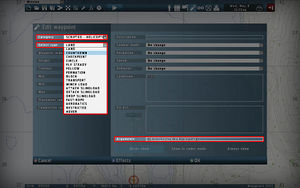Custom Waypoints: Difference between revisions
mNo edit summary |
m (Adjust for moved BIS_fnc_wpLand TKOH) |
||
| Line 8: | Line 8: | ||
== List == | == List == | ||
* [[BIS_fnc_wpLand|LAND]] | * [[BIS_fnc_wpLand TKOH|LAND]] | ||
* [[BIS_fnc_wpTimed|COUNTDOWN]] | * [[BIS_fnc_wpTimed|COUNTDOWN]] | ||
* [[BIS_fnc_wpCheckpoint|CHECKPOINT]] | * [[BIS_fnc_wpCheckpoint|CHECKPOINT]] | ||
Revision as of 14:07, 15 June 2018
Custom waypoints are a new feature introduced in Take On Helicopters. It enables community coders to add a new waypoint with all its complex functionality to easily accessible waypoint menu.
Custom waypoints are a shell for already existing scripted waypoints, where path to the executed script had to be typed in manually. New system avoids using any abolute path and wraps all the functionality in simple-to-use user interface.
Notice when you select a custom waypoint, Script field changes to Arguments, where you can pass additional data to the waypoint.
List
- LAND
- COUNTDOWN
- CHECKPOINT
- CIRCLE
- FLY STEADY
- FORMATION
- TRANSPORT
- WINCH LOAD
- ATTACH SLINGLOAD
- DETACH SLINGLOAD
- DROP SLINGLOAD
- FAST-ROPE
- AEROBATICS
- RESTRICTED
- HOVER
Config
class cfgWaypoints
{
//--- Waypoints category class
class HSim
{
//--- Waypoints category description (visible in menu)
displayName = $STR_HSIM_cfgWaypoints_HSim;
//--- Waypoint class
class wpLand
{
//--- Waypoint description (visible in menu)
displayName = "Land";
//--- Path to executed scripts
file = hsim\Modules_H\functions\waypoints\fn_wpLand.sqf;
};
};
};
Scripts
By default, all official waypoints are executing functions that can be also called manually, outside of waypoint structure. To achieve it, all of these functions are including custom header, which recognizes execution type and initializes params correctly:
#include "\HSim\Modules_H\functions\Waypoints\variableSettings.hpp"
Execution Methods
Waypoint (Editor)
Default use. Waypoint is selected in menu, arguments are typed in Arguments field (see attached picture).
Arguments are passed as Array, whose content differs for every waypoint.
For example, for BIS_fnc_wpTimed (COUNTDOWN), it can look like this:
[{hintC "You failed!"},60,true]
If no arguments are set, default values are used.
Waypoint (Script)
Attach function to given waypoint. Function waits until waypoint becomes active
[group,id,<arguments>] spawn <functionName>;
Code is done when waypoint conditions were met.
Function
Run function with given params.
[object,target,completionRadius,<arguments>] spawn <functionName>;
- object: Object - object to which waypoint belongs
- target: Array or Object - position or target where waypoint is placed
- completionRadius: Number - completion radius in which waypoint is finished
- <arguments> - arguments specific for every waypoint type
Code is done when waypoint conditions were met.
Action
Executed by addAction command.
OBJECT addaction [ "Action Name", "<functionName>" call BIS_fnc_functionPath, <arguments>, ... ];
Header Variables
Header declares local variables, which can be used by waypoint script:
- _params: Array - passed arguments
- _group: Group
- _wp: Array - assigned waypoint (current waypoint for Function and Action activation)
- _wpID: Number - waypoint ID
- _wpPos: Array - waypoint position
- _target: Object - waypoint target. objNull if none was set (e.g. when position is used only)
- _veh: Object - vehicle of group leader
- _completionRadius: Number - waypoint completion radius (Default: 420 m)
- _statements: Array - waypoint statements (Default: ["true","",""])
- _condition: Code - waypoint condition from _statements (Default: {true})
- _isExpired: Code - code for checking if waypoint is still valid. Exit when true in every loop. Always false for Function and Action execution
- _fnc_addRating: Code - adds rating to all waypoint group members. Passed argument is Number - added rating, later multiplied by bis_wpRating

